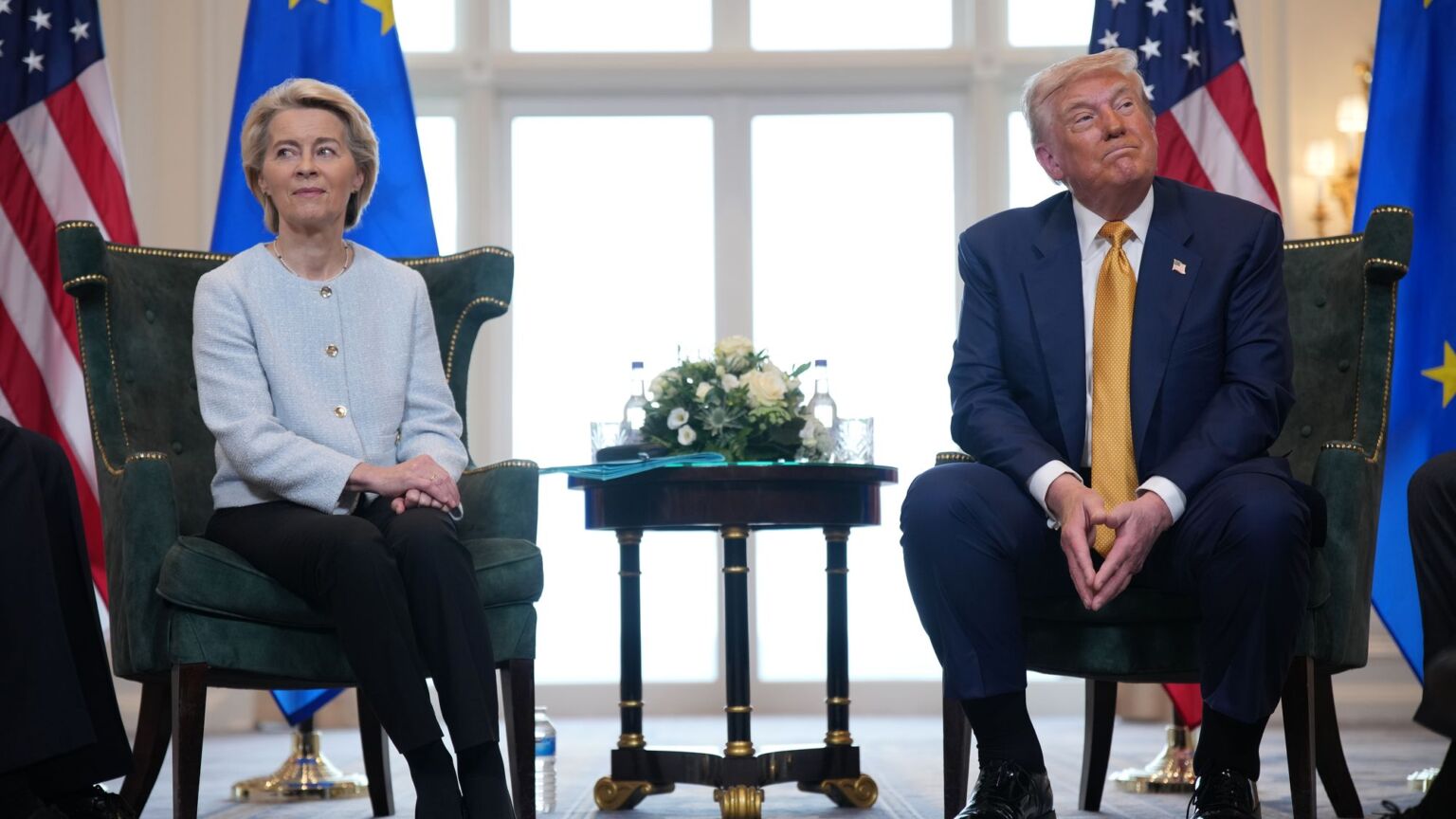Trump’s trade deal has humiliated the EU
Europe’s economic decline has been brutally exposed by this one-sided agreement.

Want unlimited, ad-free access? Become a spiked supporter.
So this is the famous ‘trade superpower’. After months of tough talk, European Commission president Ursula von der Leyen announced a trade deal with Donald Trump this week that is nothing short of total capitulation. The Commission has accepted a 15 per cent baseline US tariff on most EU goods, agreed to purchase $750 billion worth of American gas and procure billions more of US military kit. What did Queen Ursula get in return? Nothing.
‘VDL’, as she is known in the Brussels bubble, tried desperately to spin this as a win. Sitting anxiously next to Trump in Scotland last weekend, she recited impressive-sounding numbers – such as the EU and US’s combined 800million consumers and the EU’s $1.7 trillion trade volume – like a nervous student. Trump cut through the spin by greeting the deal as fantastic for US cars and agriculture. He didn’t need to say much else – indeed, it was clear for all to see that there was only one winner in this deal.
For decades, even critics of the EU had to concede that whatever its many economic and democratic shortcomings, it still possessed enormous leverage when it came to trade. At the very least, it was more than capable of defending EU interests in trade deals. Evidently, this is no longer the case. When even the hapless government of Keir Starmer can negotiate a better trade deal with Trump, the problems with the EU should be clear to see. (Tariffs on most UK goods are just 10 per cent.)
Even the most ardent Europhiles have found it hard to put a positive spin on the deal. Manfred Weber, leader of the European People’s Party (a coalition of Europe’s legacy centre-right parties), described it as ‘damage control’ and better than not reaching a deal at all. Guy Verhofstadt, former prime minister of Belgium and usually the most maniacal of EU fanboys, slammed the deal as not only ‘badly negotiated’, but also ‘scandalous’ and a ‘disaster’, with ‘not one concession from the American side’. Member states, from Ireland to France, have been similarly unenthusiastic. Yet the brutal truth is that the deal reflects how America views the EU – as strategically weak and politically empty.
Trump has taught the EU a harsh lesson in statecraft. The EU has long relied on its neighbours for energy production. It has long underinvested in defence. And now it throttles its biggest industries with green dogma. This left it with little leverage for the negotiations with the US.
Brussels’ commitment to spend billions of dollars on American gas and military kit confirmed that, for all its recent talk, the US will continue calling the shots. Indeed, from a military perspective, the deal must have been particularly humiliating. As recently as March, EU elites trumpeted their massive re-armament plan as the key to achieving European strategic autonomy. Shortly after, in typical EU fashion, it was forced to rename those plans from ‘Rearm Europe’ to ‘Readiness 2030’, because some worried it sounded too threatening. The EU, perhaps realising that it couldn’t even talk tough anymore, might well have decided that military subservience to the US was its best bet after all.
But it’s the economy, more than anything else, that explains the one-sidedness of this deal. High energy costs, stringent regulation and an overall lack of dynamism have resulted in European fortunes diverging sharply from those of the US in recent years. The US is now roughly twice as rich in per-capita terms as the EU, despite the pair being relatively equal just a few decades ago. The US and China lead the way in a host of new technologies, while the EU celebrates its regulations for an AI industry that does not even exist on European soil. The EU’s only answer to its malaise is to propose yet more centralisation and bureaucratisation of Europe’s economies, even though this is one of the very things strangling Europe’s prosperity.
In any other situation, such a pitiful deal would be setting off alarm bells for the people on the losing side of it. But for von der Leyen and her ilk, it is seemingly just another day at the office. ‘We have averted the worst’, they reassure themselves, while doing nothing to address the underlying problems it revealed. They still see Trump as an aberration, rather than a serious warning to their unaccountable, anti-democratic way of doing politics. In truth, Trump’s election victory represents the same dynamics of mass discontent with elite politics that are at work across Europe. They ignore him at their peril.
Deliberately or not, it was on the democracy question where Trump really twisted the knife in. In his press conference with von der Leyen, Trump openly mocked the totems of her presidency: green energy and borderless migration, two policies never voted on or for by Europeans, yet the ones most unsparingly enforced by Brussels. In fact, the EU’s trade disaster is deeply connected to the wildly unpopular migration policies favoured by EU elites. In both cases, the problem stems from the fact that Europe is governed by a class which has no sense of representing European, let alone national, interests. The EU’s single-minded pursuit of open borders and environmentalism are signs of an elite wildly out of touch with ordinary Europeans – and wildly unprepared for the new global era that Trump is inaugurating.
Until Europe’s political class is replaced by national movements with a strong sense of their own interests, the subordination represented by its trade deal with America will only be the beginning of its humiliation.
Jacob Reynolds is the head of policy at MCC Brussels.
£1 a month for 3 months
You’ve hit your monthly free article limit.
Support spiked and get unlimited access.
Support spiked – £1 a month for 3 months
spiked is funded by readers like you. Only 0.1% of regular readers currently support us. If just 1% did, we could grow our team and step up the fight for free speech and democracy.
Become a spiked supporter and enjoy unlimited, ad-free access, bonus content and exclusive events – while helping to keep independent journalism alive.
———————————————————————————————————————————–
Exclusive January offer: join today for £1 a month for 3 months. Then £5 a month, cancel anytime.
———————————————————————————————————————————–
Monthly support makes the biggest difference. Thank you.









Comments
Want to join the conversation?
Only spiked supporters and patrons, who donate regularly to us, can comment on our articles.